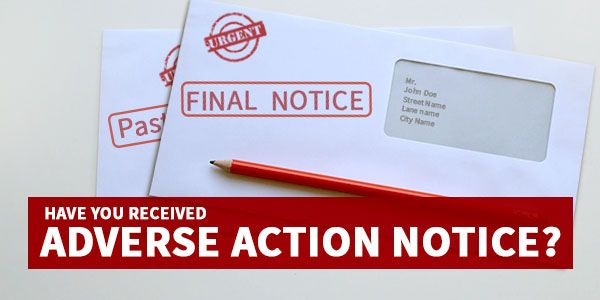Adverse Action Notice: Probable reasons and what to do

Have you applied for credit but have been denied? Well, if so, have you received an Adverse Action Notice?
What is it?
Adverse Action denotes that there’s a negative action a lender can take / has taken against you. A lender/creditor reviews your credit reports and scores and might not find you suitable to accept your credit request. It may also be a result of certain policy changes by the creditor.
Under the ECOA (Equal Credit Opportunity Act) and Regulation B, an adverse action notice is designed to help the consumers as well as the businesses to have transparency regarding the credit underwriting process. It also helps to protect credit discrimination since the creditors explain why such a particular action has been taken.
The customers can rectify certain things and again ask for approval.
What can be the probable reasons?
The most common types of adverse action in terms of credit cards are as follows:
- Reduction in credit limit
Your credit limit might get reduced if the creditor finds out that you can be a risky customer. - Credit denial
The creditor disapproves your credit request as your credit profile doesn’t meet the standards set by the issuer. - Adverse approval
This means your credit card application is approved but with less favorable terms and conditions. - Account closure
Also known as account revocation, it means that the card issuer has decided to close your account due to various reasons; one of the primary being defaulting on credit card debt payment. - Account suspension
This means you won’t be able to swipe your credit card for any new purchase until you fix the situation. - Increase in the rate of interest
The APR (Annual Percentage Rate) of your credit increases on your future purchases. However, as per the CARD Act, the credit card issuer needs to provide a notice 45 days prior to the increase in the interest rate.
What does it include?
An Adverse Action Notice usually includes the following:
- Your credit score if the creditor has considered it to make the decision
- A statement explaining the adverse action
- The name, address, and the phone number of the Credit Reporting Agency (CRA)
- Your right to get a free copy of your credit reports
- Your right to dispute any information, if required, on the reports
What are its advantages?
Yes. You get to know why your credit application has been rejected or the reason for any other adverse action.
So, instead of speculating the probable reasons, you know exactly what you need to improve to get your loan application approved or for other favorable terms and conditions.
Are there any disadvantages?
Apparently, there are no disadvantages apart from that you didn’t get an approval of what you asked for or some favorable terms and conditions have been withdrawn. But, there is always scope to rectify and improve to get credit approval or qualifying for terms and conditions favorable for you.
However, such a notice doesn’t affect your credit score negatively. But, your credit score may drop to some extent when you apply for a credit card regardless of whether or not it’s rejected. Nevertheless, multiple hard inquiries within a 45-day period are considered to be only one. So, it won’t cause a major negative effect on your credit report and score.
What should you do after getting such a notice?
As already mentioned, the adverse action notice helps you to rectify your credit report and increase your score.
So, let’s see what you need to do after you get such a notice.
Get copies of your credit reports
You are entitled to get a free copy of your credit report after you get such a notice. It is better to order copies of reports from the other major credit bureaus too.
Understand what you need to dispute or improve
Usually, you get an adverse action notice after about 7-10 business days after the denial of your credit-based application. Go through it and understand it carefully.
Dispute and fix errors if any
Errors in credit reports are quite common. So, check your personal information as well as information on financial transactions thoroughly. If you discover any error, dispute it without wasting any more time.
Repay debt and make your payments on time
Defaulting on credit card and other loan payments is one of the major causes of credit application denial. So, repay your credit cards and other unsecured debts. And be current on your other loan payments, if any.
If you’re facing any problem, explain it to your creditor/lender and make alternative arrangements.
Apply again strategically
When you think that you have rectified the necessary things and your credit report is in a proper condition, apply again. You can also check your credit score before asking for credit.
Another thing, it is advisable to pull out credit reports from all the three major credit bureaus at least once a year. Also, go through them and fix errors, if any. This can negate your chances of getting any Adverse Action Notice in the future.
